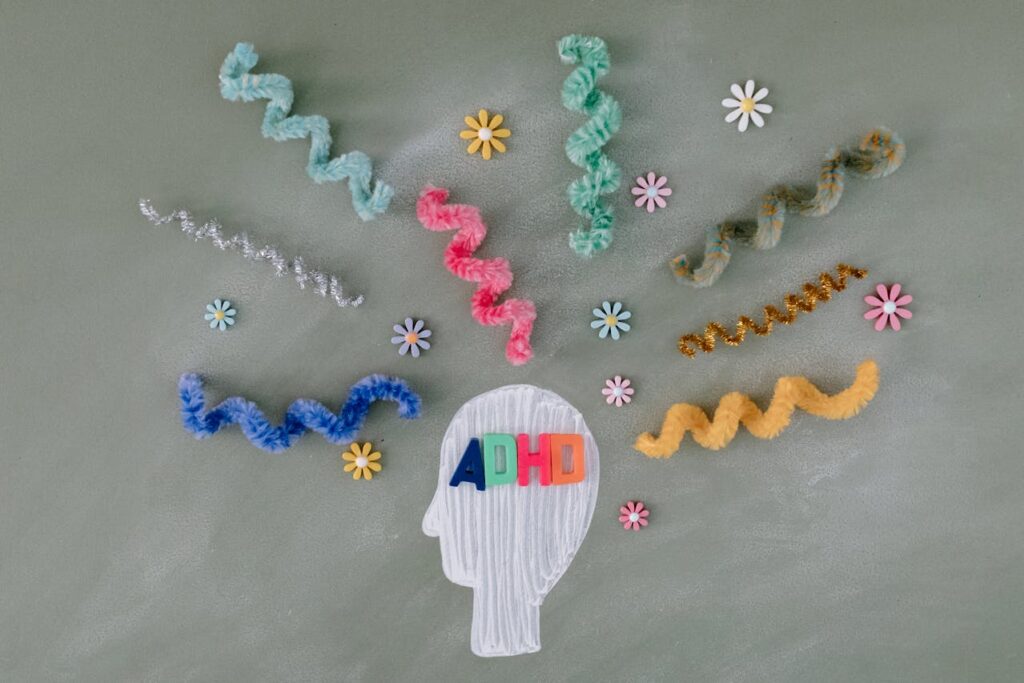
Do You Qualify for Mental Health Treatment in Massachusetts?
East Point Behavioral Health provides specialized mental health care in Massachusetts for adults aged 18 and older. We also provide online ADHD treatment for adults from other states. While we do not specialize in substance use disorders (SUD), we address co-occurring conditions and can connect you with trusted SUD treatment referrals if needed. Our mission is to remove barriers to mental health care by offering immediate intervention and prompt access to treatment. Contact us today to start your journey toward mental wellness!

What Is Attention Deficit Hyperactivity Disorder?
ADHD is a neurodevelopmental disorder characterized by difficulties with attention, hyperactivity, and impulsiveness. ADHD affects both children and adults, but the symptoms can present themselves differently. Furthermore, there are gender differences in ADHD manifestation. Understanding this disorder can help reduce stigma, provide better support, and improve treatment outcomes. That’s where our online ADHD treatment comes into play.
At East Point Behavioral Health, we take a symptom-based approach when treating individuals with ADHD, as this is far less overwhelming for them. ADHD involves many symptoms, and chances are, you don’t have all of them. With this in mind, here are some of the most common ADHD symptoms:
Inattention
A common ADHD symptom is persistent inattention, making it difficult to focus at work, school, or home. You may get distracted when completing tasks or activities, especially those requiring extra effort. This can lead to disorganization and avoidance of complex tasks. You might also regularly forget appointments, deadlines, or personal items, contributing to feeling overwhelmed.
Hyperactivity
Hyperactivity is another common symptom of ADHD. When you have too much energy, you’ll likely be fidgety and impulsive, constantly tapping or leaving your seat. It’s also common to act without thinking, such as making quick decisions with negative consequences. You may also have trouble waiting your turn in conversations and activities, often interrupting others. Adults often learn to mask these symptoms, whereas children cannot.
Impulse Control
Another issue that affects people with ADHD is impulse control. It refers to people acting on their gut feelings without thinking about the long-term consequences of their actions. This can lead to poor decision-making and possibly blurting out thoughts and responses before thinking them through. Because such behavior can look impolite to others, people with ADHD often have trouble in relationships, academics, work, and finances.
Time Management and Emotional Regulation
Tasks and deadlines may seem to slip through the cracks, and disorganization can impact work, school, and relationships. Not being able to manage your emotions only makes things worse, with individuals often experiencing brief but intense emotions that quickly shift and change. Such experiences can confuse many people and even cause them to doubt themselves, leading to low self-esteem.
ADHD Therapy In Massachusetts
If you’ve been living with ADHD for a long time, and it has negatively affected your jobs and relationships, it might feel like it’s too late to change. But this is not true at all. There is online adhd treatment, as well as in-person treatment at our clinic in MA, allowing you to manage your symptoms and achieve your goals. East Point Behavioral Health offers personalized treatment plans that may include:
Medication Treatment
ADHD medication can be hugely beneficial for adults, helping them manage their symptoms and improve their self-esteem. While there is no universally applicable solution, potential options may include stimulants, antidepressants, non-stimulants, and medications that calm nerve impulses in the brain. East Point’s medication management for mental health can make the whole process of establishing and receiving medication treatment easier.
Behavioral Treatment
Behavioral therapy, particularly cognitive behavioral therapy (CBT) and dialectical behavior therapy (DBT), is useful for ADHD. These therapies help with all aspects of life, including time management, organizational skills, and general coping skills.
Family Therapy
ADHD doesn’t just affect the individual; it affects everyone close to them. Family therapy as a part of online adhd treatment as well as the in-person one can be a great way to provide essential support, improve communication, and give everyone coping tools to manage ADHD as a family unit.
Parent Training
Parent training can help the parents of children with ADHD by teaching them about the symptoms and treatments of the disorder. Such training goes a long way in helping parents accept the diagnosis and work towards solutions. Most importantly, it helps the children feel accepted and understood, which helps them develop resilience and self-esteem.
ADHD Coaching
ADHD coaching has the potential to significantly improve lives by offering guidance and assisting individuals in managing their core symptoms. It is part of the ADHD therapy Massachusetts directed toward skill development, helping you manage the effects of ADHD and preventing its negative impact on daily functioning.
Healthy Lifestyle Choices
A healthy lifestyle can help manage the symptoms of ADHD, along with co-occurring mental disorders like anxiety and depression. If you live with ADHD, it’s important to eat well, exercise regularly, and get enough rest. Small life changes can go a long way.
Online ADHD Treatment: Flexible Care from Home
If your schedule is packed or you prefer staying home, online ADHD treatment is a smart option. You can get expert care without the drive or waiting room. Sessions are flexible and easy to join from your phone, tablet, or computer.
At East Point Behavioral Health, our virtual care is private, secure, and led by licensed professionals. You’ll meet with a therapist who understands ADHD and knows how to help adults manage focus, impulsivity, and daily challenges.
Online treatment gives you real support in real time. You’ll learn tools to stay organized, manage emotions, and improve your quality of life. If you’re looking for care that fits into your day, we’re here to make it simple.

The Benefits of Intensive Outpatient Program (IOP) For Online ADHD Treatment
There is a wide range of treatment options for ADHD in Massachusetts, and you can access them through the Intensive Outpatient Program (IOP). The benefits of choosing IOP programs in Massachusetts for your ADHD therapy are:
Access to ADHD Professionals
East Point experts have a thorough understanding of ADHD and are well-versed in the available treatments and therapies, enabling us to tailor a personalized approach for each individual. At the same time, you can also address other mental disorders that may be co-occurring with ADHD, such as generalized anxiety disorder or social anxiety disorder.
Client-Centered Care
IOS programs like ours involve clients in their care. You will receive a personalized treatment plan that addresses your unique needs and challenges, as well as outlines your goals for recovery. We encourage input from our clients, as this allows them to be active participants in their care.
Flexibility
One of the biggest benefits of IOS is its flexibility. You can receive highly intensive and personalized treatment without the commitment of staying in a residential facility. Our IOS program offers consistent ADHD support in Massachusetts, making it easier to apply what you learn in treatment to real-world situations at work, school, and home.
ADHD and Co-Occurring Conditions
ADHD often comes with other mental health challenges. Many adults also deal with anxiety, depression, mood disorders, or OCD. These can make focus, organization, and emotional control even harder.
At East Point Behavioral Health, we look at the full picture. Our team treats ADHD and any co-occurring conditions together. This approach leads to better, more lasting results. You don’t have to manage everything on your own: real support is here.
Most common ADHD co-occurring conditions:

Why Choose Us for ADHD Therapy In MA
At East Point Behavioral Health, we treat every person with care, not just their diagnosis. Our team understands the real challenges of living with ADHD and works closely with you to create a plan that fits your life.
We offer both in-person and online ADHD treatment, giving you options that are flexible and effective. From medication management to therapy and skill-building, everything is tailored to your goals. If you’re looking for compassionate experts who listen and take action, you’ll find them here.
Get Started with ADHD Therapy in Massachusetts
You can have a successful and fulfilled life despite struggling with ADHD. ADHD is a manageable condition, and once you find a treatment that works for you, nothing will stand in your way. East Point has the best ADHD therapists in Massachusetts, and they are ready to help you take the next step. Contact us for a full assessment and a customized ADHD care plan. Together, we’ll work toward empowering you to manage your ADHD and improve your quality of life.
Frequently Asked Questions
What’s the difference between in-person and online ADHD treatment?
Both in-person and online ADHD treatment programs at East Point Behavioral Health offer personalized support, but online options provide added flexibility. With virtual sessions, clients across Massachusetts and beyond can access licensed ADHD therapists without commuting, making it easier to stay consistent with care.
Can I receive ADHD therapy in Massachusetts if I have a co-occurring disorder?
Yes. Many individuals seeking ADHD therapy in Massachusetts also experience conditions like anxiety or depression. Our team is trained to address co-occurring disorders within your treatment plan to ensure a comprehensive and effective approach.
Is online ADHD treatment effective for adults with busy schedules?
Absolutely. Online ADHD treatment is especially beneficial for adults balancing work, family, or school. It offers convenient scheduling while maintaining the same quality of care you’d receive in person.
Do I need a formal diagnosis to start ADHD therapy in Massachusetts?
Not necessarily. If you suspect you have ADHD or struggle with related symptoms, you can start with an assessment at East Point Behavioral Health. We’ll help determine whether ADHD therapy is the right path for you and build a customized care plan.
How quickly can I begin ADHD therapy or online ADHD treatment?
At East Point Behavioral Health, we prioritize fast access to care. Once you complete an initial intake, we’ll match you with a therapist and begin ADHD therapy, either in Massachusetts or online, based on your availability and clinical needs.